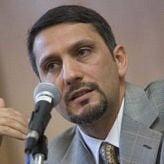PHOENIX — Claiming censorship, attorneys say Arizona State University is illegally blocking a Muslim academic from speaking on campus because of his political beliefs.
The lawsuit, filed in federal court here, says the university won’t allow Hatem Bazian to speak on campus about the “boycott, divest, sanction” (BDS) movement aimed at pressuring Israel to change its policies, particularly in regard to Jewish settlements on the West Bank. That’s because Bazian won’t sign an agreement certifying that he will not engage in a boycott of Israel.
That agreement language comes directly from a 2016 state law that bars state and local governments — and publicly funded universities — from doing business with any firm that won’t do business with Israel.
ASU, for its part, is calling the whole issue a “misunderstanding.”
Spokesman Brett Hovell said while the university is complying with the law, it does not believe the certification requirement applies here. And he said the most recent version of the form for speakers does not contain that language.
But attorney Gadeir Abbas of the Council on American-Islamic Relations Defense Fund, told Capitol Media Services that the requirement is clearly spelled out in the contract that Bazian was asked — and refused — to sign.
Now the council is asking U.S. District Court Judge John Tuchi to issue an injunction to block ASU from enforcing the provision ahead of Bazian’s scheduled April 4 appearance.
The lawsuit ultimately wants Tuchi to void enforcement of the law at all levels.
The lawsuit is the second legal challenge to the statute.
Attorneys from the American Civil Liberties Union filed suit last year after Flagstaff attorney Mik Jordahl was told he needed to sign a similar form, forswearing any boycott of Israel, as a condition of maintaining his contract to do legal work for the Coconino County Jail District.
Jordahl, who is admittedly a supporter of the boycott movement, said he should not be forced to choose between his First Amendment right of protest and his ability to perform services for government agencies.
That is also the basis for the new lawsuit.
“Boycott activity is a hallowed tradition in America,” Abbas said, citing the Boston Tea Party, the Montgomery bus boycott during the civil rights movement and the boycott against companies doing business in South Africa before it abandoned apartheid.
“It’s a very strongly protected constitutional activity.”
There’s also a political issue.
The 2016 law and subsequent events come against a backdrop of the question of the Israeli settlements in what some call the Occupied Palestinian Territories.
Some elements of the Israeli community refer to that same area as Judea and Samaria, the Old Testament names for what is now the West Bank, in an effort to show a biblical claim to the area.
Bazian, a lecturer and adjunct professor at the University of California-Berkeley, chairs American Muslims for Palestine. He also is a co-founder of Students for Justice in Palestine and, according to the lawsuit, a leader in the BDS movement in the United States.
Abbas said the Legislature, in deciding to adopt the 2016 law “chose to categorically take Israel’s side in this international conflict.”
ASU’s Hovell said the university does include the requirement that those who contract with the university agree not to engage in a boycott of Israel. But he said this contract was with a student group.
“It was a simple mistake that the ASU form containing the certification was used,” Hovell said.
“The certification was not needed.”





